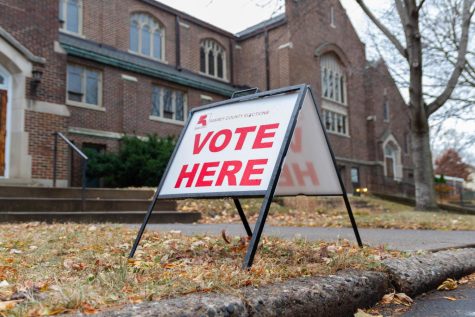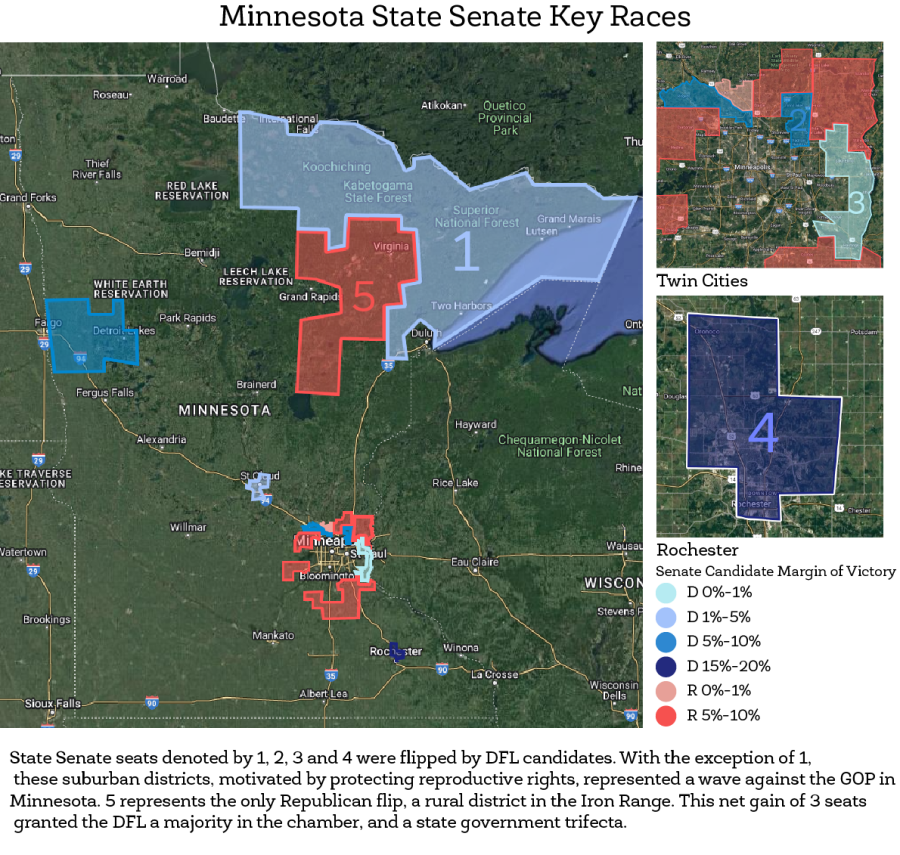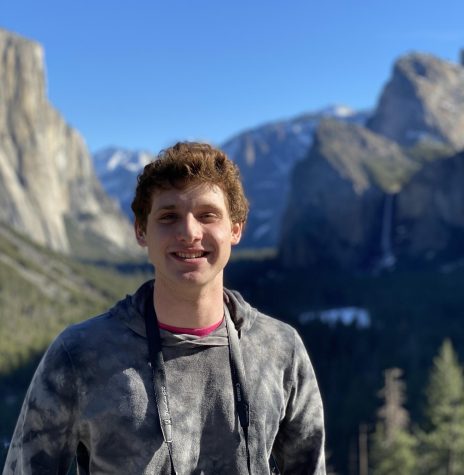Macalester students participate in history-making midterm election
November 10, 2022
On Tuesday, Nov. 8, many eligible students at Macalester joined voters across the nation in this year’s midterm elections. Positions were up for grabs at every level of government in every state in the country. In Minnesota, this included the governor, attorney general, state auditor and secretary of state office, as well as both chambers of the state legislature, all eight of the state’s U.S. House seats and many local offices.
Despite predictions of a “red wave,” progressive forces exceeded expectations across much of the country, including in Minnesota. As of early Thursday morning, every statewide Democratic Farmer-Labor (DFL) candidate had won or was leading.
Angie Craig (DFL-Prior Lake) won Minnesota’s 2nd congressional district in the Twin Cities’ southern suburbs relatively easily despite decennial redistricting shifting the district towards the GOP. The DFL held the state house and flipped several state senate seats in the Twin Cities suburbs and one in the Iron Range, flipping control of the chamber and cementing unified DFL control over state government for the first time since 2014.
On Macalester’s campus, there was a strong focus on Get Out the Vote (GOTV) efforts. In 2016 and 2018, Macalester had the highest voter turnout rate, 81.9% and 72.8% respectively, of any school participating in the National Study of Learning, Voting, and Engagement. In 2020, Macalester lost its first-place status in the survey, mainly due to high rates of mail-in voting and many students not being in the Twin Cities, but student organizations on campus, like MacDems and Mobilize Mac, which is the CEC’s home for democratic engagement at Mac, are hoping to get those numbers back up. Macalester voter turnout rates for the 2022 midterms will not be available for several months.
“I want to come back from 2020 when we had lower voter turnout,” MacDems co-president Kyra Layman ’25 said. “Sometimes there is an assumption that ‘everybody here is so engaged that I don’t have to do something,’ but we only really get that feeling if everybody is doing something.”
“Young people control the vote across this country,” co-president of MacDems Will Pierce ’25 added. “If a majority of people aged 18 to 25 voted in this country, we would control every single election and that is especially true in a state like Minnesota that is purple and in an election year that is so important.”
Pierce’s words rang true this year, with CNN reporting that the 18-29 year old voting bloc, 12% of the national electorate, was by far the most progressive age grouping in the country. It seems that the youth vote may have legitimately swung the election in the direction of progressive candidates and issues nationwide. Minnesota was certainly part of that trend.
With the intense focus on voter engagement on campus, there were many issues that galvanized Macalester students to head to the polls.
“Abortion is probably the big one,” Molly Nelson ’26 said of the issue most important to her in this election. “A big one is also, I think, legalizing cannabis.”
Pierce shared this sentiment.
“Minnesota right now is an island in the upper Midwest,” they said. “We are surrounded on all sides by states who do not have access to abortion care in a comprehensive way.”
Lola Brown ’23, the Public Policy and Justice Coordinator at the Civic Engagement Center (CEC), talked with students about important issues leading up to the Nov. 1 event with St. Paul Mayor Melvin Carter.
“The three issues that people ended up choosing were housing, education and climate issues, but things that are also important [to students include] reproductive justice, healthcare [and] gun violence, [among others],” Brown said.

In her work with the CEC and Mobilize Mac, Brown has been involved with a lot of GOTV efforts on campus. The CEC has held many tabling events, where volunteers help people learn about voting and get registered to vote. Brown was also involved in organizing the Lawn Games with Mayor Carter event that occurred on Nov. 1, which was co-sponsored by MacDems and the Community Organizing Coalition, a new student organization that is in the process of becoming formalized.
Siri Hoff ’23 is involved with the creation of the Community Organizing Coalition. For her, community organizing has been an outlet in the leadup to the election.
“For myself, I find it really hard to stay hopeful when I look at the national political landscape, so community organizing at the local level has been helpful in two ways: one, it allows me to connect with people and community members but also, change happens at the local level and people change their minds when someone you care about talks to you or shares a story about an important issue,” Hoff said.
Additionally, candidates in statewide races were important in bringing students to the polls. There were a few candidates in particular who were inspiring to members of the Macalester community.
“There’s just a lot of candidates … Keith Ellison, [Julie] Blaha, all of our statewide candidates are really important,” Ellie Spangler ’26 said.
“I hate Scott Jensen, so I voted against him,” Sidney Langford ’25 said.
Ultimately, Jensen (R-Laketown Township) lost to incumbent Governor Tim Walz (DFL-Mankato) by more than seven points and nearly 200,000 votes. Despite facing predictions of defeat, Attorney General Keith Ellison (DFL-Minneapolis) and State Auditor Julia Blaha (DFL-Ramsey) beat back right-wing opponents to narrowly prevail in their own elections.
The Minnesota DFL held control of the House. They also gained control of the Senate for the first time since 2014, meaning that Democrats in Minnesota now hold both legislative chambers and the governorship, which will allow Walz to enact a more progressive agenda that has been blocked in the past because of the split legislature.
Despite the strong turnout, passion behind the community’s key issues and eventual positive results, many Macalester voters did not want to celebrate the results prematurely, either in Minnesota or in their home states.
“[I’m] hopeful, I think,” Ari Fields ’25 said in anticipation of the election results. “Maybe not necessarily optimistic.”
Other students were decidedly more pessimistic.
“I think across the country, it’s not gonna be great, probably,” Gus Friendly ’25 said.
On a federal level, control of the Senate and House of Representatives was undecided as of early Thursday morning, a far cry from prognostications of sweeping Republican victories nationwide.
The 2022 elections also marked several electoral firsts in Minnesota. Districts across the Twin Cities elected Minnesota’s first ever Black women state senators, with Erin Maye Quade (DFL-Apple Valley), Clare Oumou Verbeten (DFL-Roseville) and Zaynab Mohamed (DFL-Minneapolis) winning seats in southern Dakota County, Roseville and the Longfellow neighborhood of Minneapolis respectively.
Quade and Verbeten were also the first queer women elected to the state senate, and Mohamed is the youngest woman state senator in Minnesota history. In St. Anthony Park’s District 66A, Leigh Finke (DFL-St. Paul) became Minnesota’s first transgender state legislator.
For many first-years at Macalester, the 2022 midterms marked their first time in a voting booth.
“[It was] very empowering to participate in the U.S.’ democracy,” first-time voter Caroline Fitzpatrick ’26 said.
Brown echoed this, saying, “Voting is something we do as an act of care to others and to promote care and love in our communities.”
Considering the influence of the youth vote on the election and the values many young voters hold, at Macalester and elsewhere, this rings especially true.














